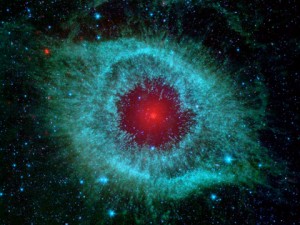Does God Exist?
Scientific and philosophical arguments supporting monotheism.
Bible Summary

This is a short listing of Bible passages describing the nature of God. The description that the Bible presents of God includes many more pieces of information. However, here is a summary description of the passages that we have examined.
God is the Source and Creator of All. Everything that exists has been created by God and it continues to exist by His sustaining will. God created the universe “out of nothing”. The Latin term “ex nihilo” out of nothing is the type of description that the Bible provides for this creative action. God’s creative work was not to take some special material and use it to create the universe. There was no material in existence and God simply created all things out of nothing. This creative work would begin from absolutely nothing.
But what if there was some kind of existing eternal substance that God simply used to create our universe? What would this mean? If there was some type of eternal matter, then how do we know that God is in a position to control it? It might be that this co-eternal material is beyond His ability to sustain and regulate. This idea can lead to the concept of thinking that puts God into the position where He cannot control things such as evil or natural calamities. The reason evil exists and natural tragedies take place is because God cannot control or stop it. This limitation of God’s sovereign power would mean that there may be other areas of life and existence where God cannot exercise His will. The events of the future or the ultimate purpose and plan that God has instituted may be beyond His ability to control.This however, is not what the Bible teaches.
The Bible does not teach that matter is eternal but instead it teaches that the universe was created (matter, space and time) and that the universe and time itself came into reality when God performed His creative work.
“In the beginning God created the heavens and the earth”. Genesis 1:1 “the worlds were framed by the word of God so that the things which are seen were not made of things that are visible” – Hebrews 11:3.
The Bible also teaches that the universe continues to exist because God sustains it and allows it to function and remain. Psalms 104 – He sustains all of nature. Psalms 121 – He sustains all of mankind.
God is immense in power, knowledge and presence. He is limitless and infinite.
The presentation of God in the Scriptures is One of absolute power and authority. He radiates His presence and influence everywhere and He applies His knowledge perfectly in all situations. His power does not extend to anything that is self-contradictory or contrary to the laws of logic.
It also does not include actions that are not in agreement with His nature and divine attributes. He places self-restrictions on His power and He abides within the laws of nature that He has created. He reserves the authority to act temporarily with displays of power that may go beyond the laws of nature, however not against the laws of nature.
God is self- existent, Spirit and invisible to the material world.
God is not material but Spirit. He is unchanging and sovereign over all things and in need of nothing. He is transcendent – separate and distinct from creation and yet He is imminent – near to us. “God who made the world and everything in it, since He is Lord of heaven and earth does not dwell in temples made with hands nor is He worshipped with men’s hands as though He needed anything, since He gives to all life, breath and all things. And He has made from one blood every nation of men to dwell on all the face of the earth and has pre-appointed times and the boundaries of their dwellings, so that they should seek the Lord in the hope that they might grope for Him and find Him, though He is not far from each one of us for in Him we live and move and have our being” – Acts 17:24-28.
God is perfect in truth, holiness and love.
God is the source and foundation of truth. Without Him there would be no certainty or absolutes. Truth means reality, genuineness, veracity. God is completely true in all His ways. God is Holy – absolute moral purity, complete absence of any evil. He is to be revered as holy. God is love. His love is absolute, un-conditional and extends to all men.
God is moral in all areas in the application of His perfection.
God is true and faithful. He is faithful to His character, His word and His promises. God is merciful, gracious, compassionate, forgiving and good. This is shown toward those who are in distress and in need of mercy. God is righteous and absolutely just. Holiness is the essence of the nature of God and righteousness is that holy nature in action. He punishes and judges evil. He cannot overlook evil and injustice and by no means will clear the guilty.
God is a Person

God has all of the characteristics of a person – intelligence, emotions and will. This Biblical description of God is a confirmation of the (4) philosophical arguments that we have examined here. The cosmological argument points to God’s power, eternal perfection, immutability, self-existence and creative nature. The teleological argument makes the case for God’s immense wisdom, knowledge and intelligence. The moral argument requires a just, absolute, righteous moral Law Giver. The moral purpose argument displays God’s ultimate purpose, plan and will for His creation.
These characteristics of God as indicated in the (4) philosophical arguments are elaborated and greatly expanded on in the Scriptures. The Bible tells us not only that God exists, but it tells us what kind of God He is. He is worthy of our pursuit and love. To truly know Him is to love Him.
We started out this presentation asking the questions – Does God exist? Is He out there? I believe that when we examine the case for the existence of God with an open and humble heart we will respond with – YES. God does exist. He is out there. Here’s the final question: